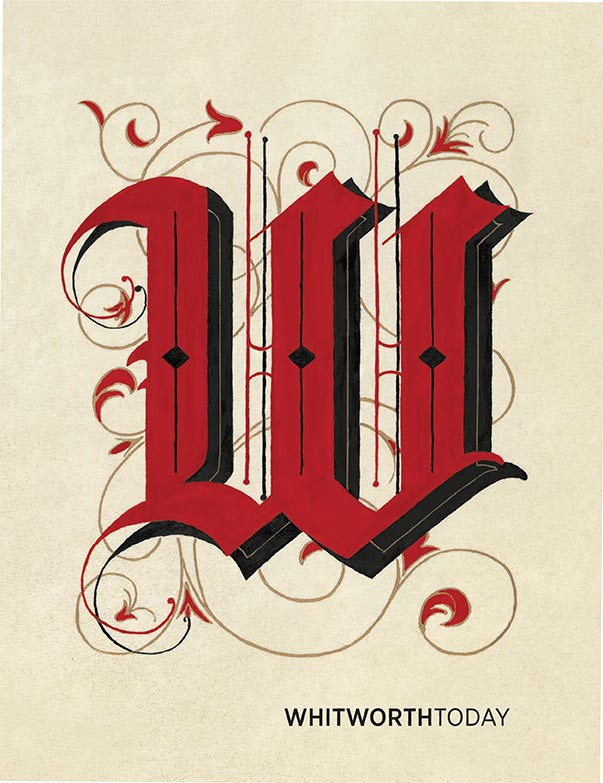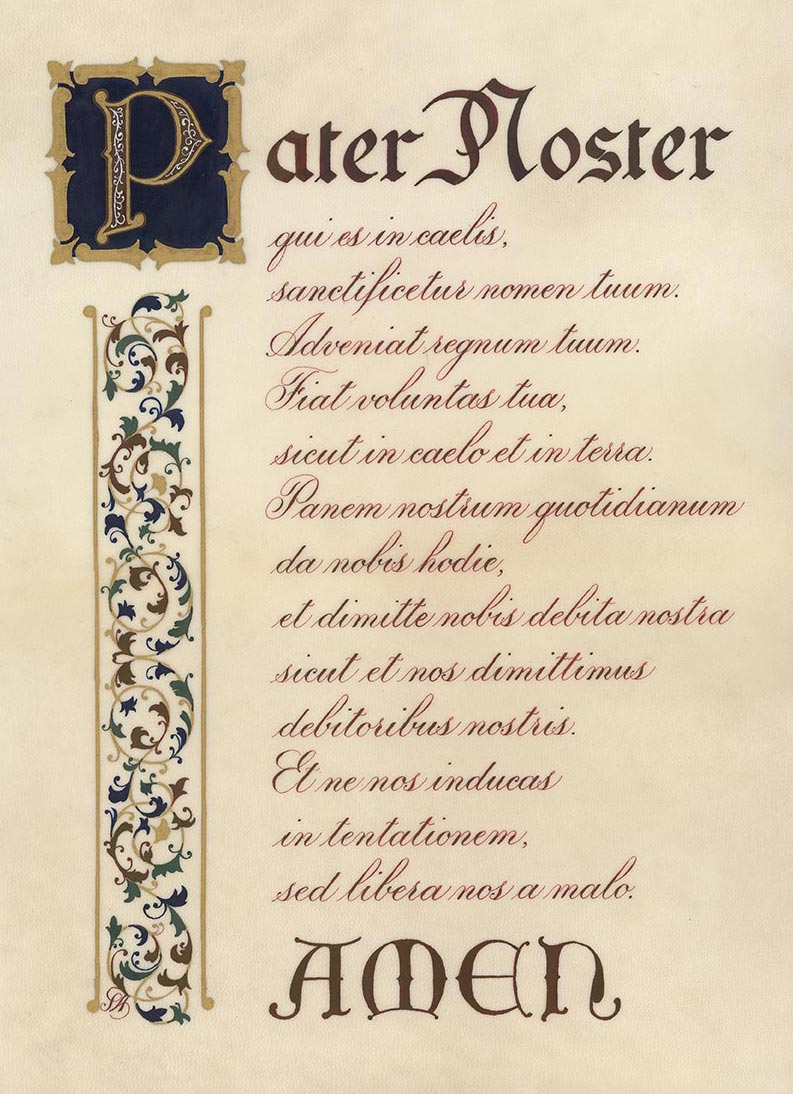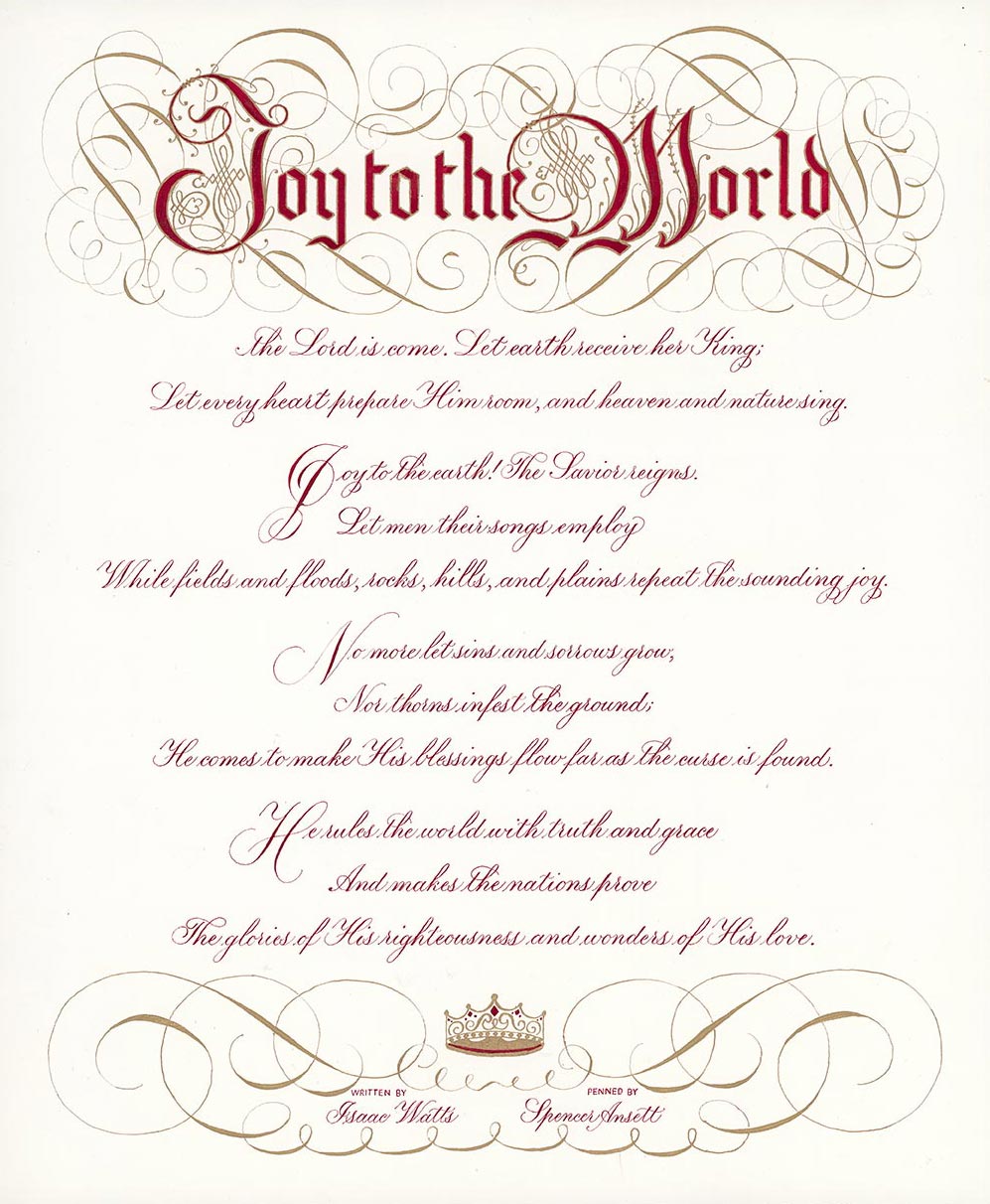
Spencer Ansett '15 planned to go pro. The four-year pitcher for Whitworth baseball gave his all to playing professional baseball. But when his dream didn't pan out, he activated Plan B, putting his business management degree to work in the recruiting field. He currently works as an executive search consultant with the Mullings Group.
In a studio at his home, Ansett applies his competitive drive and business acumen to an art form through which he also expresses his Christian faith. (Ansett designed and created the cover art for the spring 2025 issue of Whitworth Today, and he creates art for his online store.) In the following interview, this fascinating, self-effacing Renaissance man shares about his journey in calligraphy, his formative Whitworth experiences, and the insights he has gained along the way.
How did you get into calligraphy?
I have three siblings and we all played sports, especially my two brothers and me. My mom was feeling like we liked sports a little too much, so we had to have what she called a "creative outlet." It had to be non-sports-related and we needed to practice it. She wanted us to be well-rounded young men.
My creative outlet initially was piano, and I did not enjoy practicing at all. I was introduced to calligraphy in fifth grade by an art teacher at school, and I really took to it. The teacher nudged me and my mom and said, "Hey, Spencer's actually pretty good at this." My mom proposed trading piano lessons for calligraphy lessons, and I said, "Absolutely."
How does your competitive drive in sports translate to doing calligraphy?
Growing up, I always wanted to win. But somewhere along the way, I figured out that it's about improving much more than it is about winning. If I focus on improving myself as opposed to looking around me, that's going to be a more productive route, and that becomes the competition. Sure, you're trying to win games, but you want to improve and see a track record of improvement.
After I finished my college baseball career, a part of me was like, "Now what? Where is the competition, that improvement component?" Calligraphy fills that same bucket because I can work to get better at it, and I can always learn new things.
In what way does calligraphy connect to your Christian faith?

I believe the source of all words is The Word, Jesus Christ. There are so many word-focused verses in Scripture, like "Out of the abundance of the heart, the mouth speaks" [Luke 6:45]. Words have profound significance to our lives, and I have a unique opportunity to present words in a meaningful way visually through calligraphy. You can do so much to enhance words through the colors, the fonts, the surroundings you choose. Ultimately, giving words glory gives The Word glory.
How did you land at Whitworth?
I worked very hard at baseball in high school and wanted to play in college. Whitworth was on to me early my junior year. Dan Ramsay [former Whitworth head baseball coach] sent me a letter. But I was looking at other schools, wanting to play Division I. Then I got injured and wasn't performing very well. Dan would call me, to check in. It wasn't, "Are you coming here?" it was just, "How's it going?"
And then I went to the Honors Colloquium scholarship competition [now Honors Scholarship Weekend] at Whitworth and ended up winning it, which blew my mind. Full tuition is pretty hard to turn down, and I had this relationship with Dan. I knew it was going to be a good place.
What were your long-range goals in competing on the baseball team and majoring in business management?
To be frank, I majored in baseball. I wanted to play professionally, and I worked hard to try to accomplish that. But I was 100 percent delusional about my ability to play professional baseball. Whether or not that happened, I knew majoring in business would be a good foundation. I took some fantastic classes and learned a lot. From a career angle, Whitworth gave me direction. The only reason I took a look at [a career in corporate] recruiting is because I was a business management major.
What Whitworth experiences or people made the most impact on you?

My wife, Jessica [(Webber) Ansett '15], comes to mind immediately. I'm so glad I ended up at Whitworth for that purpose alone. And then my friends and teammates. I'm still good friends with my freshman roommate, Trent, on the second floor of Arend, and across the hall, Nathan, and down the hall, Ryan. I invested heavily in baseball, and it's those relationships and what I learned on the field that paid the most dividends. I have so many cherished friendships with my teammates. We have an alumni weekend that's one of my favorite weekends of the year, just to see people and reconnect.
And then there are the professors. I think back to this now: At Whitworth, there are so many people who are pouring into you without you even knowing it. And then you graduate, and that first year out is quite an abrupt transition. You’re like, "Wait, why don't people care about me anymore?" To have a lot of people giving guidance and investing in you and wanting you to succeed is a rich time. I really enjoyed the amazing people there.
How do you apply your experiences in business and athletics to your calligraphy work?
To me, the difference between potentially being a commercial success in art and not is discipline. So many people think creating art has got to be spontaneous self-expression. But there are not many things that go well when you only do them if you feel inspired. That's a low bar. The best creators and artists are unbelievably disciplined. They know what they're about. They have vision. It's very business-oriented how they approach art. It has served me well to go into calligraphy with the mindset that deadlines are good. I don't know where to go with this project, but I'm going to work on it, because that's what's required.
You're married, a parent of four children and you work full time, yet you also dedicate time to the art and business of calligraphy. What advice would you share with others who want to develop and commit to an interest or skill?
Everything you say "yes" to means you're saying "no" to other things. So count the cost. I asked myself, "Do you really want this, or is this a hobby?" It came down to, "If nobody knew I did [calligraphy] and I never released a single thing, would I still be doing it?" And the answer was totally "Yes." I don't have many things I'm involved in – they had to go. That's when you get into the zone of late nights, early mornings. That's what it takes, especially when life gets busy.